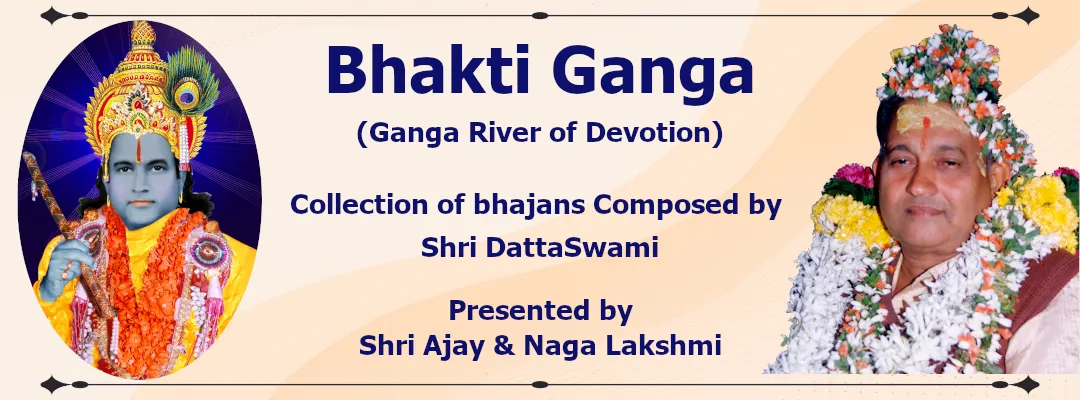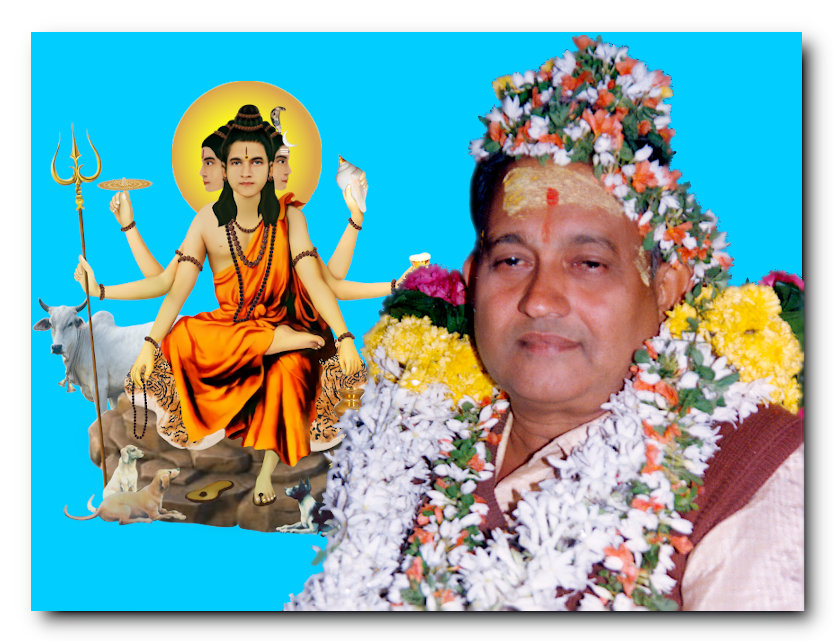
05 Jan 2002

(Sung by Swami)
भज भज दत्तम्। भज भज दत्तम्। भज भज दत्तम्। ब्रह्मदत्तम्। (पल्लवी)
Worship Brahma Datta, seated as the President in the holy parliament of sages and angels.
ॐ तत् सवितुः तत् देवतायाः, वरेण्य भर्गो धीमहीह,। प्रचोदयेद्वै धियो यो नः, तं ब्रह्माणं ज्ञानसूर्यम्॥१॥
Meditate upon the greatest (vareṇyam) radiation (bhargaḥ) of Savitā, the deity of creation. The greatest radiation or the greatest creation of the Creator (Savitā) is awareness. It refers to the living human medium of the Human Incarnation of God (Sadguru). This Savitā is indeed Brahmā. He is Datta, the Knowledge-Sun, who kindles our intellect.
प्राणिप्रसवाद्यः प्रसिद्धः, सवितेत्यस्य ब्रह्मतेजः। शिष्यधियश्च प्रेरयेन्नः, तं गायत्री मन्त्रसारम्॥२॥
Savitā is the Creator of the world. He is like the sun and His radiance illuminates the intelligence of disciples. He alone is the deity of Vedic Gāyatrī hymn.
गायत्रीयं छन्द एव, सविता देवः स्मर्यते च। शिष्यान्धकार मुकुलिताब्ज, धीविकासदं गुरुवरेण्यम्॥३॥
Gāyatrī is only the name of the Vedic meter in which the so-called Gāyatrī hymn is composed. Savitā, the Creator, is the deity worshipped through the hymn. Savitā is the sun-like Divine Preacher. His radiance (spiritual knowledge) causes the intellects of disciples, which are like closed lotus buds due to the darkness of ignorance, to blossom like lotuses when the sun rises.
कर्ता भर्ता ह्येष हर्ता, सर्वस्याऽस्य श्रूयते हि। त्रिमूर्तिरूपं ब्रह्म चैकं, ब्रह्माऽकारं ब्रह्मवाचम्॥४॥
He alone is the Creator, Ruler and Destroyer of creation as per the authority of the Veda.
He is the single Brahman present in the three divine forms (Brahmā, Viṣṇu and Śiva) of the Divine Trinity. He alone is the author of the Veda.
त्रिपदं छन्दः त्रिस्वरोक्तं, त्रिकालवन्द्यं त्रिगुणसूत्रम्। त्रिवाहिनीनां सङ्गमं वा, त्रिमूर्तितत्त्वं यं व्यनक्ति॥५॥
The three lines of the Gāyatrī meter in which the hymn is composed, the three Vedic accents used while reciting the hymn, the three junctures (sandhis) of time when the hymn is recited in the day, the three strands of the sacred thread held in the hand while reciting the hymn; all indicate the holy merging of the three divine forms (Brahmā, Viṣṇu and Śiva) into the single form of Lord Datta, as if they were the three holy rivers, Ganga, Yamuna and Saraswati.
ओङ्कारश्च त्रिविधवर्णः, त्रिस्रो व्याहृतयोऽपि यं हि। सम्बोधयन्ति सर्वमन्त्रो, यमेव वक्ति त्रिगुणमेकम्॥६॥
AUM, which is the union of the three letters, ‘A’, ‘U’ and ‘M’, the three sacred utterances (words), bhūḥ, bhuvaḥ and suvaḥ, and the entire hymn of three lines; all indicate the three forms of the single basic Brahman, which are the personifications of His three basic qualities.
चत्वारोऽयं वेदशुनकाः, गौरनुसरति च वेदधर्मः। वीणाश्रवणं वाणीपतिं, षोडशवर्षं ब्रह्मदेवम्॥७॥
The four Vedas have turned into dogs to follow Him loyally. The deity of justice has turned into a cow to follow Him alone. He enjoys the vīṇā-music played by Goddess Vāṇī. He is Brahmā, the ever-youthful Lord, who always appears to be sixteen years old.
जगदारम्भं हंसवाहं, तेजोवदनं मन्त्रमूलम्। गायत्रीशं सामगानं, विद्यानिलयं वेदपाठम्॥८॥
He is the Creator of the world and His vehicle is a swan. He is the Lord with a radiant face, who composed the Vedic hymns. He is the Lord of Gāyatrī and the singer of the Sāma Veda. He is the abode of knowledge, reciting the Veda.
यज्ञाचरणं होमनिष्ठं, कमण्डलुधरं दर्भपाणिम्। अग्निज्ज्वाला भासमानं, प्रातस्सन्ध्या बालभानुम्॥९॥
He is the one providing food to hunger-fire in the Vedic sacrifice. He bears a water-pot (kamaṇḍalu) and grass-garlands in His hands. He looks like the red flames of the holy fire in the altar and like the tender red rising sun.
चन्दनतिलके कुङ्कुमाङ्कं, ब्रह्मतेजसा दीप्यमानम्। त्रिजगन्मोहन सुन्दराङ्गं, काषायधरं पण्डितेशम्॥१०॥
On His forehead, He bears a mark of sandalwood paste with a red kuṅkumam mark on it. His dazzling form shines with divine radiance, mesmerizing all the worlds with His divine beauty. Wearing red robes, He is the topmost scholar of the scripture.
अत्रेः पुत्रं ब्रह्मदत्तं, अनसूयाम्बा प्रेमराशिम्। अजिनमेखलं ब्रह्मदण्डं, यज्ञोपवीतमक्षमालम्॥११॥
He is the Son of sage Atri and is called Brahma Datta. He is heaped with the love of mother Anasūyā. He wears a woven grass belt on His waist and holds the Brahmadaṇḍa stick in His hand. He wears the three-stranded sacred thread across His shoulder and holds a garland of beads in His hand.
स्वतनोरुद्यत्कमलगन्धैः, त्रिभुवनानि ह्लादयन्तम्। ब्रह्ममुहूर्ते साधकानां, प्रचोदयेत्ता यो धियो नः॥१२॥
The scent of lotuses emitted from His body gives immense joy to all the three worlds.
In the early morning, He illuminates our intellect-lotuses with spiritual knowledge.
सृष्टि क्रमवद पुरुषसूक्तं, त्रिस्वरबद्धं पावनार्थम्। ऋषिभिः पठितं ब्रह्मकाले, श्रुत्वा श्रुत्वा प्रीयमाणम्॥१३॥
Sages recite with the three holy Vedic accents, the Vedic Puruṣa Sūktam, which reveals the process of creation. He hears it in the early hours and is greatly pleased.
त्रिमताचार्यैः पठ्यमानान्, तत्तन्मतमय भाष्यवादान्। श्रुत्वा सिद्धान्तार्थमन्त्यं, समन्वयमतं वाचयन्तम्॥१४॥
The three divine preachers read their commentaries, which form the three holy philosophies. At the end, after listening to them, He gives His final conclusions, correlating their philosophies.
वेदन्ताना-मन्तिमार्थं, वेदन्तार्थं बोधयन्तम्। ऋषिभिः परितो भाषमाणं, शास्त्रर्थेषु व्यञ्जितेषु॥१५॥
He is sitting in the middle, surrounded by sages asking Him the secrets of the Holy Scriptures. He reveals to them the final essence of the scriptures, correlating the various Vedic statements.
आयुधवर्जित पाणिपद्मं, वाचैवाऽरिं मारयन्तम्। कर्मफलानि ललाटपत्रे, लिखन्तमायुर्दाय दानम्॥१६॥
He bears no weapon in His hands since His word itself is a weapon capable of killing anybody anywhere. He writes final judgements on the forehead-papers of souls, including their lifespans.
आचार्येन्द्रं वाक्प्रचारं, भुवि सञ्चारं निर्विचारम्। खलाभिचारं सदाचारं, सुरपरिचारं चित्तचोरम्॥१७॥
He is the king of preachers, propagating spiritual knowledge through His speeches as He travels all over the earth without any tension. He punishes the evil, follows good traditions and is served by angels. He is so attractive that He captivates our minds.
पद्मसम्भवं पद्मपीठं, पद्मसुगन्धं पद्मवर्णम्। पद्मापुत्रं पद्मनेत्रं, पद्मसुपाणिं पद्मपादम्॥१८॥
He is born from a lotus, seated on a lotus, and having the colour and scent of a lotus. He is the Son of the Lotus-Deity (Padmā) and His eyes, hands and feet, are all likes lotuses.
वीणापाणिः यस्य शिष्या, वाणी गायति ज्ञानदेवी। तं वागीशं सामवाचा, चरशोणाधर मन्त्रपाठम्॥१९॥
Goddess Vāṇī, His student, is the deity of knowledge. She plays the musical instrument, vīṇā and sings about His poetic glory as He sings the Sāma Veda with graceful movements of His red lips.
यत्सङ्कल्पः केवलं हि, सर्वं विश्वं रचितमेवम्। आद्यं देवं प्रथममूर्तिम्, आराधनीय-मजमनादिम्॥२०॥
He made one wish to create the world. His will itself instantly materialized to form this creation. He is the first Energetic Incarnation of the unimaginable God and is the first to be worshiped.
ललाटरेखां कर्मबद्धां, परिमार्ष्टुं यः केवलो हि। सर्वसमर्थो लेखकोऽयं, धातारन्तं मूलमूलम्॥२१॥
He alone is capable of changing the judgment written on the foreheads of souls. He is the one who decides the destiny of souls and grants the fruits of their deeds. He is the source of all sources.
चतुराम्नायां श्चतुरवाचा, चतुरास्याब्जै रुद्गिरन्तम्। कविङ्कवीना-मादिकाव्यं, सर्वजगदिदं विरचयन्तम्॥२२॥
His four heads are composing the four Vedas; each in its own unique poetic style. He is the poet of poets whose first epic composed is this expressed universe.
परमब्रह्म ब्रह्मशब्दो, यस्मिन्नेव प्रकृतिहेतौ। पूजाऽतीतं परमपूज्यं, दिवसाऽरम्भे पूजनीयम्॥२३॥
His name is Brahmā. Brahman is the name of the unimaginable God Himself, who is beyond imagination, above any worship. He is worshiped in the early morning itself.
गायत्र्याद्या यस्य भार्याः, त्रिशक्तयस्ता-स्त्रिमुखपद्मम्। देवपितॄणां पितरमेव, पितामहाख्यं ब्रह्मरूपम्॥२४॥
Gāyatrī, Sāvitrī and Sarasvatī, are the personified divine powers, and His three beloved wives.
He is the Father of the Father-Gods and hence, He is called the grandfather, Parabrahman.
॥फलश्रुतिः॥
श्री दत्तब्रह्मगायत्रीं, यो गाये-द्ब्रह्मकालिकीम्। स ब्रह्मतेजसा दीप्तो, ज्ञानी ब्रह्मत्वमश्नुते॥
In the early morning, those who pray to Lord Brahma Datta through this prayer called the Gāyatrī, get illuminated by His radiance and understand the ultimate God.
शतायुर्दायमाप्नोति, सर्वविद्याः प्रपद्यते। सत्पुत्रं लभते होमा-दैश्वर्यं ब्रह्मवीक्षितः॥
Those who sing this prayer live for 100 years, enlightened with spiritual knowledge. Those who sacrifice in His name, get blessed by His grace, and their issues also become devotees.
भज भज दत्तम्। भज भज दत्तम्। भज भज दत्तम्। ब्रह्मदत्तम्।